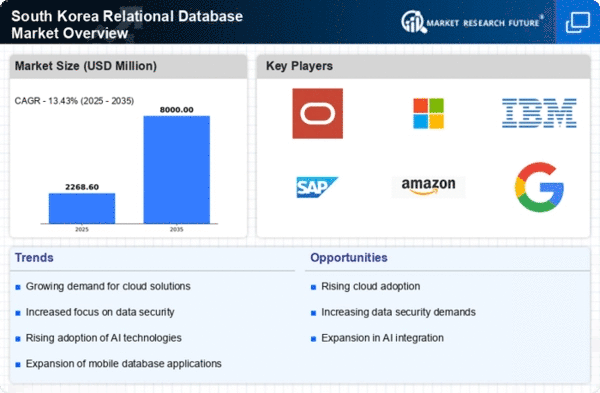Rising Demand for Data Analytics
The increasing emphasis on data-driven decision-making is propelling the relational database market. Organizations in South Korea are increasingly leveraging data analytics to gain insights and enhance operational efficiency. This trend is reflected in the growing investment in relational database solutions, which are essential for managing large volumes of structured data. According to recent statistics, the data analytics market in South Korea is projected to grow at a CAGR of approximately 15% over the next five years. This surge in demand for analytics tools is likely to drive the adoption of relational databases, as they provide the necessary infrastructure for data storage and retrieval. Consequently, businesses are expected to prioritize relational database solutions that can support advanced analytics capabilities, thereby fostering growth in the relational database market.
Increased Focus on Data Governance
The emphasis on data governance is becoming increasingly prominent in South Korea, impacting the relational database market. Organizations are recognizing the importance of managing data quality, privacy, and compliance with regulations. This focus on governance is driving the demand for relational database solutions that offer robust data management features. Companies are seeking databases that provide comprehensive auditing, data lineage, and access controls to ensure compliance with local regulations. As businesses strive to enhance their data governance frameworks, the relational database market is likely to benefit from this trend. The need for reliable and secure database systems that facilitate effective data governance is expected to grow, leading to increased investments in relational database technologies.
Emergence of Hybrid Cloud Solutions
The rise of hybrid cloud solutions is reshaping the relational database market landscape in South Korea. Organizations are increasingly adopting hybrid cloud architectures to balance the benefits of on-premises and cloud-based database solutions. This approach allows businesses to maintain control over sensitive data while leveraging the scalability and flexibility of cloud services. The hybrid cloud market is projected to grow significantly, with estimates suggesting a CAGR of around 20% over the next few years. As companies seek to optimize their IT infrastructure, the demand for relational database solutions that seamlessly integrate with hybrid cloud environments is likely to increase. This trend may drive innovation in relational database technologies, as vendors strive to meet the evolving needs of businesses operating in hybrid cloud settings.
Growth of E-commerce and Digital Services
The rapid expansion of e-commerce and digital services in South Korea is driving the relational database market. With the increasing number of online transactions and digital interactions, businesses require robust database solutions to manage customer data, transaction records, and inventory information. The e-commerce sector in South Korea has witnessed remarkable growth, with online sales projected to reach approximately $100 billion by 2025. This surge necessitates reliable relational database systems that can handle large datasets and ensure data integrity. As a result, companies are investing in relational database solutions to support their digital operations, thereby contributing to the overall growth of the relational database market. The demand for scalable and efficient database systems is expected to rise as e-commerce continues to flourish.
Technological Advancements in Database Solutions
Technological innovations are significantly influencing the relational database market. In South Korea, advancements such as in-memory databases, distributed databases, and enhanced query optimization techniques are reshaping how organizations manage their data. These innovations enable faster data processing and improved performance, which are critical for businesses operating in a competitive landscape. Furthermore, the integration of artificial intelligence and machine learning into relational database systems is enhancing their capabilities, allowing for more sophisticated data management and analysis. As companies seek to leverage these technologies, the relational database market is likely to experience substantial growth. The adoption of these advanced solutions is expected to increase, as organizations aim to optimize their data management processes and improve overall efficiency.
















